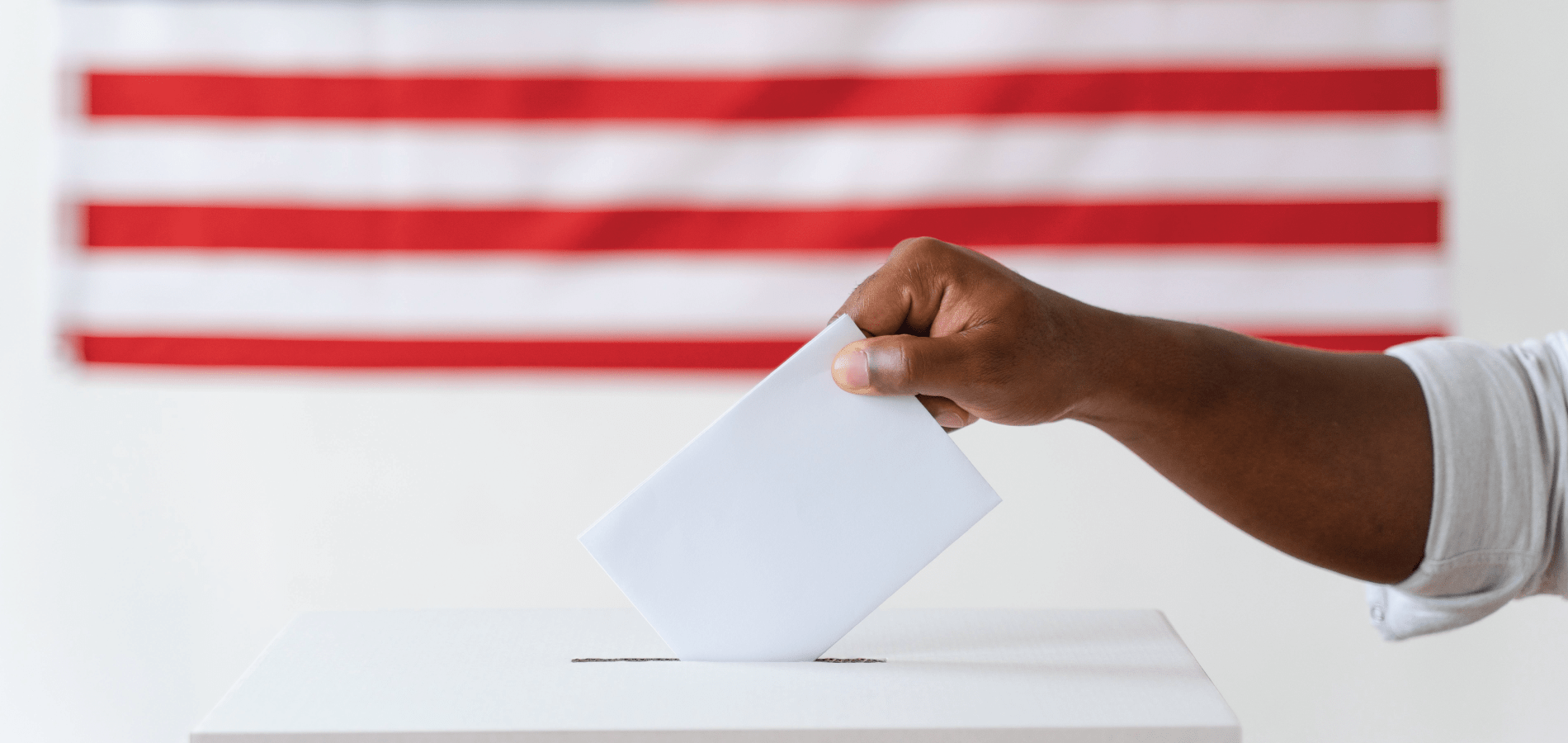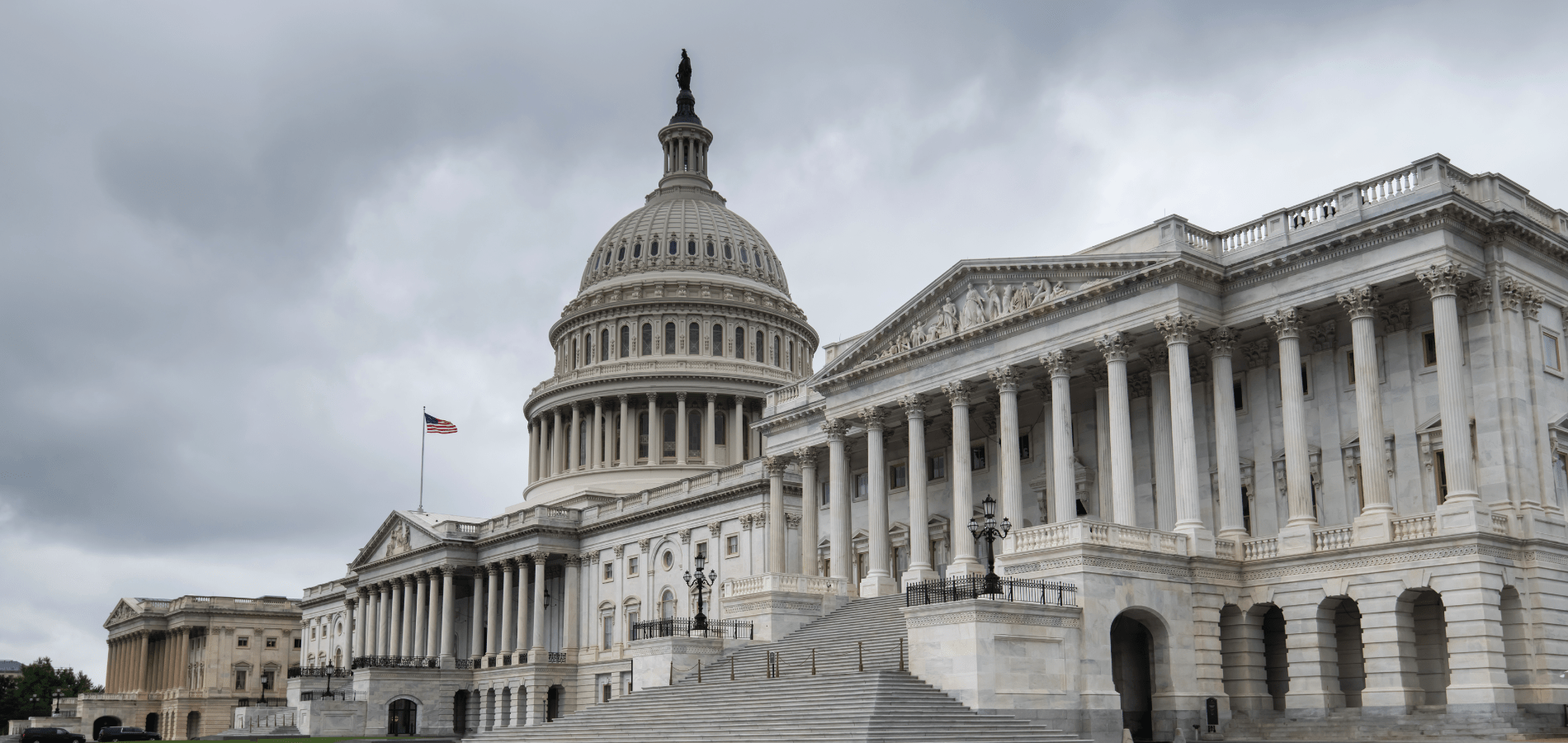More than a decade ago, Barack Obama became not only the 44th president of the United States, but also the first African-American to serve in the office. His unique backstory, eloquence and charisma, and platform of hope and change won him the presidency, but what did he accomplish during his two terms? Join HeinOnline as we explore the highlights of those historic eight years with the most comprehensive presidential collection available in digital format: HeinOnline’s U.S. Presidential Library.
The U.S. Presidential Library holds more than 780 titles consisting of nearly 800,000 pages. The database includes Messages and Papers of the Presidents, Daily and Weekly Compilations of Presidential Documents, Public Papers of the Presidents, documents relating to impeachment, Title 3 of the Code of Federal Regulations (CFR) and a host of other related works.
Learn more about this useful resource by following the link below.
Obama’s Life, Career, and Campaign
Early Life
Born in Hawaii, Barack Obama was the son of University of Hawaii students Ann Dunham (from Kansas) and Barack Obama, Sr. (from Kenya). When he was three years old, Obama’s parents divorced and his father returned to Africa. The elder Obama would return only once to visit his son before his untimely death in 1982.
After her divorce, Obama’s mother married Indonesian student Lolo Soetoro, picking up her life in Hawaii to move to her new husband’s country. Obama spent four years in Indonesia before returning to Hawaii to live with his grandparents, where he would spend the rest of his formative years.
In 1979, Obama enrolled in Occidental College in Los Angeles where he began to publicly advocate against South African apartheid. As a junior in college, he transferred to Columbia University in New York City, graduating in 1983 with a Bachelors of Political Science and a specialization in international relations.
Advocacy Work and Law Career
Two years later, Obama moved to Chicago to work as a church-based community organizer, implementing job training, tutoring, and tenants’ rights programs. In 1988, he enrolled in Harvard Law School, becoming editor of the Harvard Law Review in his first year. In his second year, he became the first black president of the journal and a research assistant to constitutional scholar Laurence Tribe. View Tribe’s own contributions to the journal.
From 1992 to 2004, Obama taught constitutional law at the University of Chicago Law School while also directing a voter registration campaign, working for a Chicago law firm, and serving on the board of directors for the Woods Fund of Chicago and the Chicago Annenberg Challenge.
Legislative Career
In 1996, Obama was elected to the Illinois State Senate. During his tenure, he negotiated and sponsored legislation that helped reform welfare, healthcare, and law enforcement practices. While campaigning for a seat on the U.S. Senate in 2004, he delivered the keynote address at the July Democratic National Convention. That November, Obama made history once again when he won by 43%, the largest margin of victory in the history of Illinois U.S. Senate elections.
During his Senate career, Obama was involved in immigration reform, armament reduction, campaign finance and election reform, and climate control.
Campaign for Presidency
In 2007, Barack Obama announced his intent to run for President of the United States, citing healthcare reform, increased energy independence, and ending the Iraq War as his primary concerns. The financial crisis of 2007 and 2008 caused the economy to also become a major talking point for Obama and his opponent, Senator John McCain.
On November 4, 2008, Obama won the presidency with nearly 53% of the popular vote. With a total of 69.5 million votes, his tally is still today the largest ever won by a U.S. presidential candidate. Upon his inauguration in January of 2009, Obama entered the presidency already burdened by two ongoing foreign wars, a worldwide economic recession, and a record-low international favorability rating for the United States.
Obama’s Foreign Accomplishments
The War in Iraq
Soon after his inauguration, Obama announced that the war in Iraq would end within the next eighteen months, scheduling the official date for August 31, 2010. Sure enough, on that day, Obama shared the news that the nation’s combat mission in Iraq was over. A little more than a year later, the last U.S. troops were removed from Iraq.
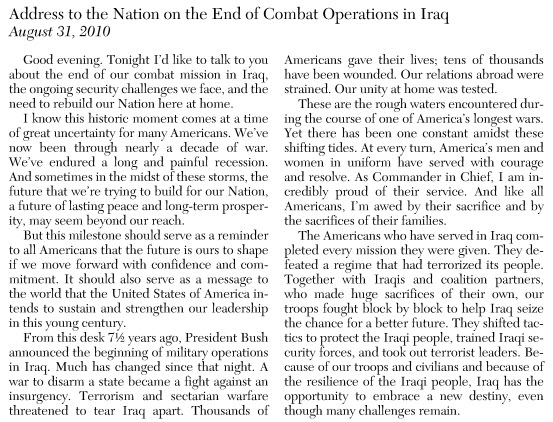
Death of Osama Bin Laden
Nearly a decade after the tragic events of September 11, 2001, the mastermind behind the attacks—Osama bin Laden—was found and killed in a covert operation under the Obama administration. Though it took years of planning, the operation itself only lasted 40 minutes. On May 1, 2011, President Obama addressed the United States regarding the raid.

Chemical Weapons in Syria
In 2013, the deadliest chemical weapons attack since the 1980 Iran-Iraq War was performed in Ghouta, Syria, killing hundreds of Syrian men, women, and children. Read Obama’s remarks on the situation in Syria.
The White House published a formal assessment of the Ghouta attacks, controversially placing blame for the tragedy directly on the Syrian government. While some questioned the evidence, Obama requested that Congress authorize military force against Syria for these actions; Congress ultimately denied the request. Read the proceedings and debates regarding Obama’s request in the Congressional record.
Instead, President Obama negotiated with Russia about either eliminating Syria’s stockpile of chemical weapons, or transferring the weapons to international control. The U.S. and Russia came to an agreement in September of 2013, establishing a deadline for the removal of Syria’s chemical arms. As a result of the negotiations, Syria joined the Chemical Weapons Convention, outlawing the production, stockpiling, or use of such arms.
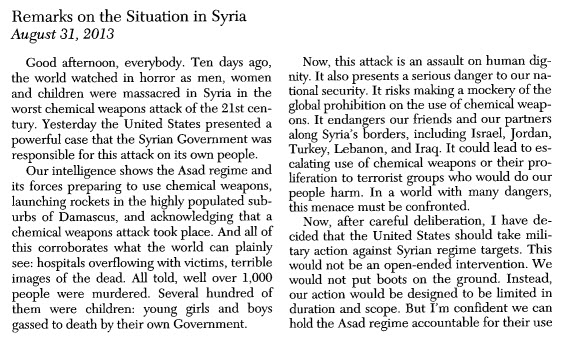
Iran Nuclear Deal
In the same year, Obama furthered U.S. relations with Iran, initiating the first direct contact between the two countries in more than 30 years. For the next two years, Obama and Iranian President Hassan Rouhani worked to reach an agreement regarding Iran’s nuclear program. In July 2015, a Joint Comprehensive Plan of Action was created between Iran, the United States, and the European Union which would ultimately lift some sanctions on Iran in return for the country’s willingness to end its nuclear program. Read the transcript of President Obama’s weekly radio address announcing the deal.
Critics of Obama’s efforts toward this plan argued its inevitable culmination in the United States as a primary financier of terrorism.
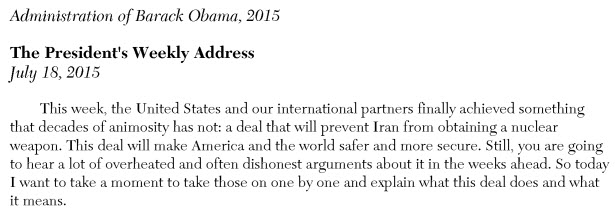
Cuba Negotiations
In 2013, Obama began to reopen a peaceful dialogue with Cuba after more than fifty years of strained relations. After lengthy negotiations, Obama and Cuban President Raúl Castro formally announced an agreement to normalize U.S.-Cuban relations in December 2014. As part of the agreement, the United States and Cuba exchanged respective prisoners and began easing restrictions on trade and travel.
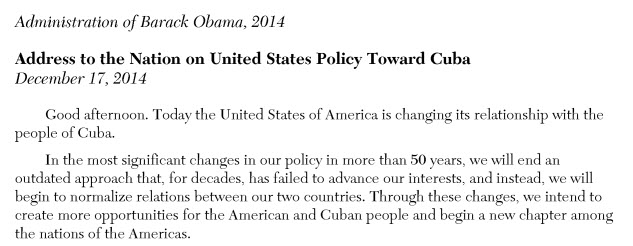
Obama’s Domestic Efforts
Response to “The Great Recession”
President Obama also made efforts to lower the national debt and deficit and ensure that the U.S. government was held accountable for its financial obligations. To do so, he signed into law the American Recovery and Reinvestment Act of 2009. A $787 billion economic stimulus package, the “Recovery Act” was based on the idea that to slow the recession and save and create jobs, the government should increase its public spending. View the legislative history of the act and read President Obama’s remarks on the package.
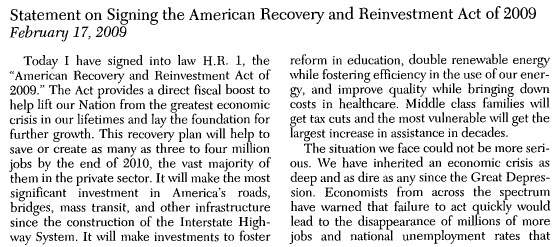
Healthcare Reform
A key campaign promise and goal for Obama was the passing of healthcare reform legislation. In 2010, Obama signed the Patient Protection and Affordable Care Act (ACA) into law. The most significant overhaul of the U.S. healthcare system since 1965, the law instituted an individual mandate requiring nearly all individuals to have health insurance, while also expanding their rights and protections under that insurance and providing subsidies to make that insurance more affordable. View the legislative history of this act, and then read President Obama’s remarks on its passage.
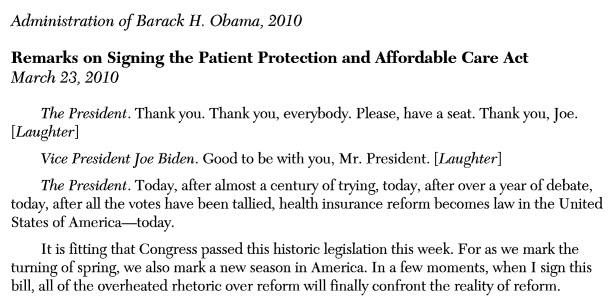
Alternative Energy
In 2015, Obama announced his final version of the Clean Power Plan initially proposed by the Environmental Protection Agency (EPA) a year earlier. The plan was intended to lower the levels of carbon dioxide coming from power plants by requiring states to meet carbon dioxide standards. In 2016, the United States under the Obama administration additionally confirmed that it would sign the Paris Agreement, a long-term international plan to limit the increase in global average temperature.
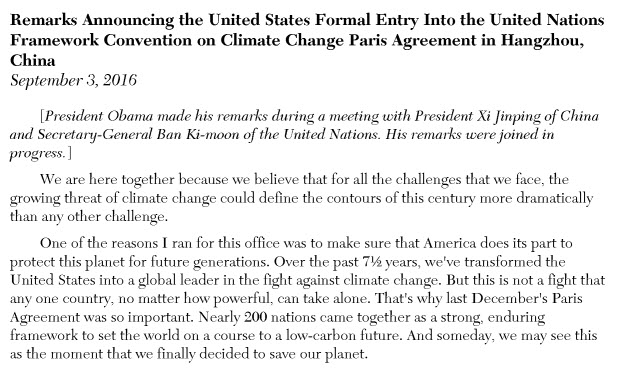
Gun Control
In the month following the Sandy Hook shooting of 2013, President Obama signed 23 executive orders and made several proposals regarding gun control. In 2016, the president further cited Sandy Hook and other shootings to announce new executive orders requiring more extensive background check requirements.
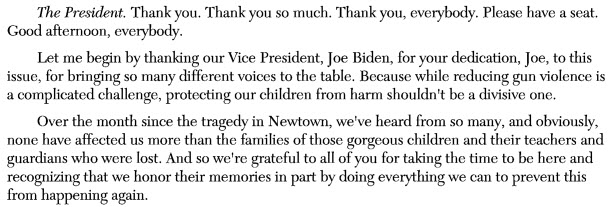
Did You Enjoy This Post?
If you enjoy reading about U.S. presidents, their accomplishments, and their biggest trials, check out some of our similar works below.
- Secrets of the Serial Set: The Impeachment of Bill Clinton
- The Watergate Scandal, Part III: The Serial Set
- Social Security Turns 84: A History of Roosevelt’s Landmark Act
- You Gotta Fight For Your Right To Equality: 55 Years of Civil Rights
Don’t miss out! Hit Subscribe to have blogs like these sent directly to your inbox.

